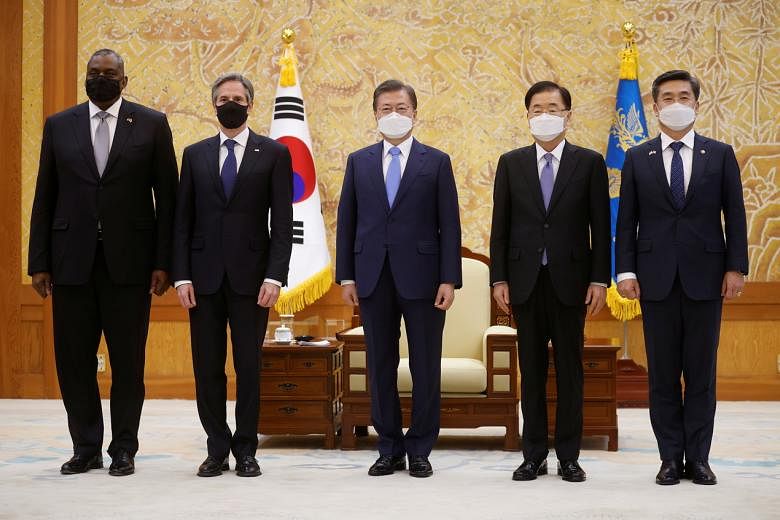SEOUL (BLOOMBERG) - South Korea's defence minister signalled the country may strengthen its military cooperation with rival Japan as the two US allies work to boost regional security against threats like the ones posed by North Korea.
Suh Wook, who held talks last week with US Secretary of State Antony Blinken and Defence Secretary Lloyd Austin on their debut trip abroad since taking office, said Seoul considers Japan as one of its crucial security partners and wants to continue its cooperation with the neighbour in partnership with the US.
"What is protecting the Korean Peninsula is centred around the Korea-US alliance, but we believe the Korea-Japan security cooperation is also a valuable asset, which is why we need to maintain this," Suh said in a Bloomberg Television interview, a day after finishing talks with the US envoys.
The visits to Tokyo and Seoul by Blinken and Austin appeared to help defrost chilly relations between the neighbours, who host the bulk of American troops in the region.
Ties plunged during President Donald Trump's tenure as tensions arising from historical differences touched off a trade dispute that at one point threatened global supply lines for semiconductors and nearly led South Korea to abandon a joint intelligence-sharing agreement.
The defence minister also said that Seoul would continue to develop its alliance with the new Biden administration, allowing it to play a bigger security role on the international stage.
President Moon Jae-in's government has embarked on one of the country's biggest military build-ups in years, seeking to add an aircraft carrier and nuclear-powered submarine.
The moves would allow it to project more power abroad and comes after the Trump administration pushed Seoul to increase its presence in international security arrangements, such as guarding waterways in the Middle East from which South Korea receives the bulk of its oil.
The Biden administration has also been seeking help from allies to form policy against what Blinken called Chinese "aggression and coercion", which puts South Korea in a difficult position. Beijing is its biggest trading partner and a key player in persuading North Korea to wind down its nuclear arsenal.
Suh said there had been advancements in the long-delayed transfer of wartime troop management known as Operational Control Authority, or OPCON, from the US to South Korea and highlighted South Korea's New Southern Policy, aimed at elevating ties with Southeast Asia and India.
Here are some highlights from the interview:
On Japan co-operation: "There is indeed the matter of history-related issues, but we feel that the Korea-Japan relations are needed in terms of defence cooperation. We will continue to hold military talks and continue on cooperation in the future."
On plans for aircraft carrier: "It's for preparing against potential threats in the future - a matter of range for the Korean Peninsula - and to secure flexibility for matters such as humanitarian assistance, which is why we believe it's necessary."
On OPCON transfer: "Actually, there's not much difference in terms of bringing the current combined forces command to a future version of the combined forces command besides switching the position of the commander-in-chief and the deputy commander-in-chief. In that sense, our stance in readiness doesn't have much of a change besides the citizenship of the commander-in-chief, so we believe there's no need to be worried about the issue of our readiness posture."
On regional strategy: "We have a principle that our New Southern Policy can be just like regional cooperation in terms of addressing different issues. We believe we can work with other countries that are also pursuing the New Southern Policy in terms of different sectors through cooperation."
On global policy: "We will continue to develop the alliance into a complementary, and future-oriented global alliance while expanding the horizons of cooperation," he said in written comments to accompany the interview.

